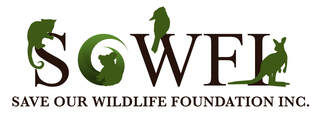Help Us Help Our Wildlife In South Australia
Why do our wildlife need our help?
Adelaide is home to 77% of the South Australian population making it the most centralised of all Australian states. Agricultural land occupies 53% of the state, most of which has been cleared for crops and animals. The north of the state is our outback desert country where they receive less than 200mm of rain a year. As the population increases in the city and the suburbs spread further out, the already small amount of viable habitat left for our wildlife gets even smaller. We are already seeing the effects of hotter summers with more and longer periods of heat over 40c. Already we are seeing an increase in the number of animals impacted by the heat, more traffic on the roads, pets, disease and humans.
Who is SOWFI?
While there are a number of wildlife care groups spread across the state, the founding members of Save Our Wildlife Foundation Inc (SOWFI) want to create an organisation that responds to the latest scientific evidence, works harmoniously with key stakeholders, provides members with operational transparency, and importantly, cares for it's volunteers who are often face high levels of stress and are prone to compassion fatigue.
Our organisational objectives are to rescue and rehabilitate orphaned and injured animals in addition to providing education and awareness programs, fund and participate in conservation programs and generally help South Australians connect with our beautiful and precious wildlife.
(Ref: http://www.agriculture.gov.au/abares/research-topics/aboutmyregion/sa)
The area currently covered by SOWFI is Adelaide and surrounds, extending into the South East and down to the Fleurieu Peninsula. We hope to expand this over time.
Partner Organisations
We partner with Wildlife Rescue Australia, a national 24/7 phone line, to provide the best service to the public and quickest outcome for animals. If a SOWFI member is not available to rescue an animal in trouble, Wildlife Rescue Australia will look outside SOWFI to other organisations to assist.
How You Can Help
SOWFI is 100% volunteer run. Having only just launched (July 2019) we need money to support the running of the organisation, to subsidise some of our volunteers expenses and eventually to fund research and conservation projects locally. We also need people to take on tasks and spread the load, especially with a busy Spring/Summer just ahead of us.
Can you help out in any of the following ways?
Become a Financial Member
Annual membership is only $55/year and your regular support will help us to build a well governed, transparent organisation and support researchers looking at ways to benefit our local wildlife.
Donate - if you would prefer to make a one-off donation to support the carers of a particular species or you would like to nominate exactly where your money is to be directed please head on over to our Donations page.
Volunteer in an Administrative or Operational Role
We are looking for people who can be reliable and commit even 1-2 hours a week to help with the role of running the organisation. Can you assist with publicity and fundraising, data entry, property management, graphic design, content writing, event management, data entry, IT, administrative tasks?
Job descriptions are available here for vacant positions.
Volunteer as a Phone Coordinator
Our partner organisation, Wildlife Rescue Australia, is looking for more phone coordinators who can commit to a minimum of 4 x 4 hour shifts per week. These shifts are available over a 24 hour period and training is provided. Apply here.
Volunteer as a Rescue and/or Carer
To ensure all of our Wildlife Volunteers are well trained in the latest evidence-based methods of animal care, mentored and supported we are limiting our intake of volunteers to 2 intakes per year. As many of us have worked in wildlife care for a number of years and have built up networks of contact over time, our first intake in July 2019 will be by invitation. If you are really keen to be a SOWFI Rescuer and/or Wildlife Volunteer please send in your application for review at the next intake in January 2020.
Adelaide is home to 77% of the South Australian population making it the most centralised of all Australian states. Agricultural land occupies 53% of the state, most of which has been cleared for crops and animals. The north of the state is our outback desert country where they receive less than 200mm of rain a year. As the population increases in the city and the suburbs spread further out, the already small amount of viable habitat left for our wildlife gets even smaller. We are already seeing the effects of hotter summers with more and longer periods of heat over 40c. Already we are seeing an increase in the number of animals impacted by the heat, more traffic on the roads, pets, disease and humans.
Who is SOWFI?
While there are a number of wildlife care groups spread across the state, the founding members of Save Our Wildlife Foundation Inc (SOWFI) want to create an organisation that responds to the latest scientific evidence, works harmoniously with key stakeholders, provides members with operational transparency, and importantly, cares for it's volunteers who are often face high levels of stress and are prone to compassion fatigue.
Our organisational objectives are to rescue and rehabilitate orphaned and injured animals in addition to providing education and awareness programs, fund and participate in conservation programs and generally help South Australians connect with our beautiful and precious wildlife.
(Ref: http://www.agriculture.gov.au/abares/research-topics/aboutmyregion/sa)
The area currently covered by SOWFI is Adelaide and surrounds, extending into the South East and down to the Fleurieu Peninsula. We hope to expand this over time.
Partner Organisations
We partner with Wildlife Rescue Australia, a national 24/7 phone line, to provide the best service to the public and quickest outcome for animals. If a SOWFI member is not available to rescue an animal in trouble, Wildlife Rescue Australia will look outside SOWFI to other organisations to assist.
How You Can Help
SOWFI is 100% volunteer run. Having only just launched (July 2019) we need money to support the running of the organisation, to subsidise some of our volunteers expenses and eventually to fund research and conservation projects locally. We also need people to take on tasks and spread the load, especially with a busy Spring/Summer just ahead of us.
Can you help out in any of the following ways?
Become a Financial Member
Annual membership is only $55/year and your regular support will help us to build a well governed, transparent organisation and support researchers looking at ways to benefit our local wildlife.
Donate - if you would prefer to make a one-off donation to support the carers of a particular species or you would like to nominate exactly where your money is to be directed please head on over to our Donations page.
Volunteer in an Administrative or Operational Role
We are looking for people who can be reliable and commit even 1-2 hours a week to help with the role of running the organisation. Can you assist with publicity and fundraising, data entry, property management, graphic design, content writing, event management, data entry, IT, administrative tasks?
Job descriptions are available here for vacant positions.
Volunteer as a Phone Coordinator
Our partner organisation, Wildlife Rescue Australia, is looking for more phone coordinators who can commit to a minimum of 4 x 4 hour shifts per week. These shifts are available over a 24 hour period and training is provided. Apply here.
Volunteer as a Rescue and/or Carer
To ensure all of our Wildlife Volunteers are well trained in the latest evidence-based methods of animal care, mentored and supported we are limiting our intake of volunteers to 2 intakes per year. As many of us have worked in wildlife care for a number of years and have built up networks of contact over time, our first intake in July 2019 will be by invitation. If you are really keen to be a SOWFI Rescuer and/or Wildlife Volunteer please send in your application for review at the next intake in January 2020.









